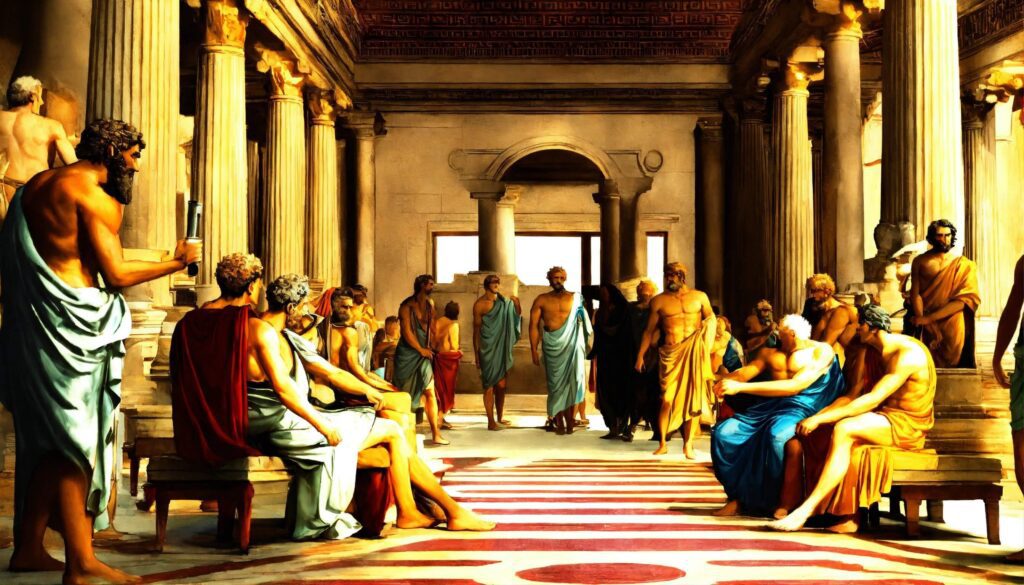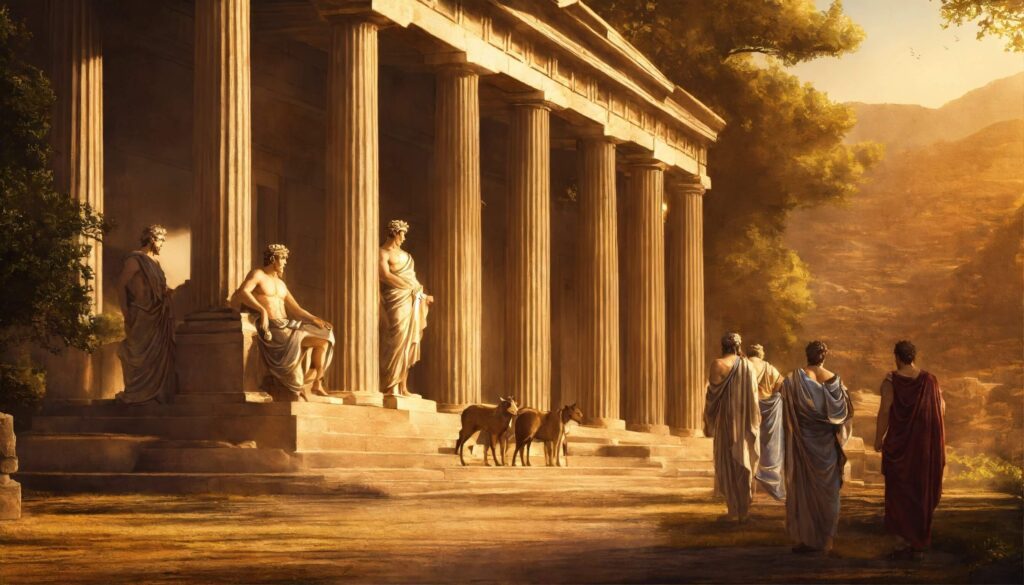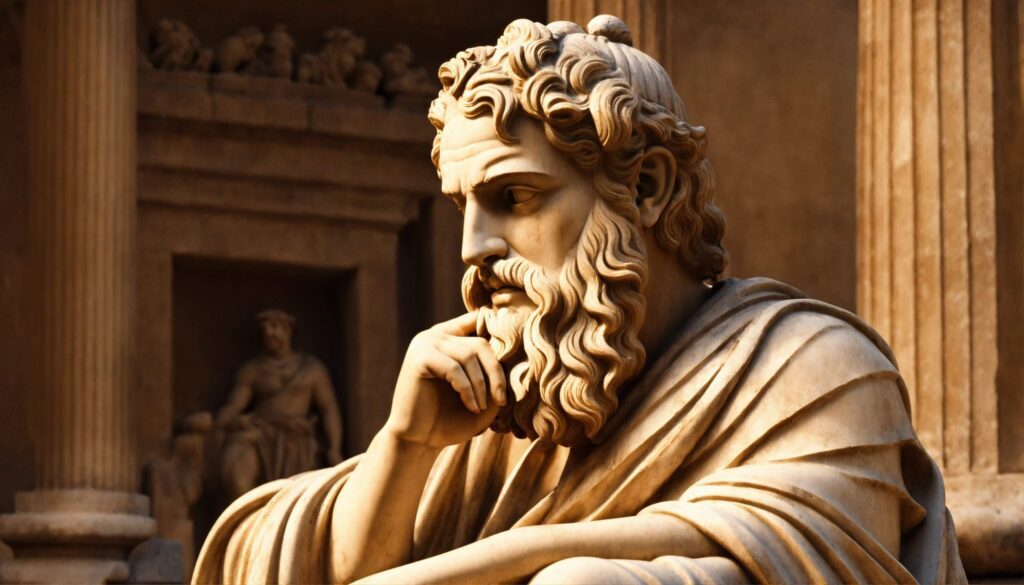Pre-Socratic philosophers
1. Anaximander
Among the thinkers who are often called pre-Socratic philosophers, Thales took water, his disciple Anaximenes saw air, and Heraclitus saw fire as an element of the whole world.
And then Empedocles brought all four of these elements into the cornerstones of the universe. Living in the same physics, just like each of these different arguments among philosophers, Anaximandros sees the present world as a runaway phenomenon in which the properties of confrontations are pitted against each other, and at the forefront of four of these confrontations: warmth, coldness, dryness, and wetness.
Soon he concludes that the fundamental primary substance of the universe cannot be characterized by one of these conflicting properties.
That’s because, in this early stage of thinking, quality, and substance would never have been distinguished. Since there is constant change and confrontation in the object, there should be no end in itself to achieve this constant change and accept its extinction.
Apeiron
So Anaksimandros defined quantitatively infinite things as “Apeiron” without conflicting with other materials. This is a neutral noun of the adjective Apeirus.
Apeirus means “undecided” and “undefined”. Apeiron means “infinite sincerity” and “unrestrained”. This theory, which came from logical reasoning rather than experience, later became an important concept in history and was the first attempt to explain the world in detail.
What I felt while studying ancient Greek philosophers is that some of them vaguely saw the truth that we now know and believe in as reason, and I think Anaksimandros was one of them.
If he looks at the concept of “limitless,” it is not the God we believe in, but it is not limited internally and not limited externally, but there is no distinction and invisible between the two. He was a man who introduced abstract thinking to philosophical thinking, as well as an empirical investigator and mathematician.
Since there is constant change and confrontation in the object, there should be no end in itself to achieve this constant change and accept its extinction. In particular, he thought that at the beginning of today’s theory of evolution, humans evolved from fish.

2. Anaximenes of Miletus
Anaximenes of Miletus, B.C 585~525, was the last philosopher of the Milletos School. He saw the underlying raw material as air. This usually means dark fog, but the concept he spoke of is very similar to today’s concept.
If the water in Thales is arbitrary, then the Apeiron in Anaksimandros is abstract. Anaximenes postulated air as an intermediate between the two. The Greeks thought that the soul would bind each part of the human body like a string, but also wind and air would surround and sustain the whole world. It’s said that air is not just natural water, it’s the human spirit, it’s talking to us on the phone.
He saw that the difference between air humor and thinness resulted in three states of matter. He spoke uniquely of soul. One of his followers said, “Our souls are air, and although it’s much colder than the air in the sun, it’s hotter than the air outside us.”
He also expressed the same meaning by saying that the human spirit is “a small part of God,” that God is the universe, and they think that the universe is still alive. In any case, this idea of seeing the soul as being material, like air or breathing, is primitive. If you introduce the concept of circulation to the ideas of Anaksimenes, it can be a Heraclidean worldview.
3. Anaxagoras:
Spermata
If you explain the concept of these seeds through meals, food is invisible to our eyes, but bones and flesh, and blood are contained in the form of seeds, and in the digestive process, the seeds in the food are mixed with the blood and rain in our bodies.
Anaxagoras was a Clazomenai person from Ionic who dated Pericles, the symbol of Athens democracy and was convicted of profanity for claiming that the sun was a burning stone, not a god. He accepted the ideas of Parmenides and Empedocles.
In his view, the arche that makes up the world is infinite, everything is in everything, and everything is together. It seems to be creating and disappearing in our senses, but in reality, it’s mixing and separating. So he came up with the concept of ‘Spermata‘.
Nous
Anaxagoras was a philosopher among the Greeks who faintly shared matter and mind, and the first philosopher to mention the teleological mindset that only came to form when he came to Aristotle by saying that the world does not run autonomously, but forms a certain order by Nous.
Anaxagoras raised the concept of ‘nous‘ for the first time in the history of philosophy. He says that Nus rules all things by himself, but he doesn’t mix with anything else and gets no help.
It penetrates everything and gives it a proper order. If the world is not given a constant orientation by the power of intelligence in the process of change, several elements only produce a confused bond. Nuss is the subject of the world’s order, even if it cannot be detected by the senses.
Parmenides was the first philosopher who could be known by the mind at the expense of “what is known by the senses.” The word “Nous” here was first said by Anaxagoras.
Anaxagoras raised the concept of ‘nous’ for the first time in the history of philosophy. Nuus, as Anaxagoras said, was referring to the existence of the mind, but it was also a concept related to the matter. At that time, there was no concept of non-matter.
What he says is that you govern everything yourself, but you don’t mix with anything else and you don’t get any help. It penetrates everything and gives it a proper order.
Conford says, “The basis for this order will be found not in any previous state of things that became apparent, but for any purpose that the order was intended for, or intended to serve.
Perhaps Socrates could only understand, and could understand, these kinds of reasons.” If the world is not given a constant orientation by the power of intelligence in the process of change, several elements only produce a confused bond. Nuss is the subject of the world’s order, even if it cannot be detected by the senses.
Socrates took away the material and natural character from such a soul concept and presented the concept of the soul (mind) in contrast to the material or body that we understand today.
And to the neo-Platonist Flotinos, Nuus is the first to flow out of the straight line and is the power to move the soul. News is the reason or universal intelligence, that is the basis of the world.
According to Aristotle, perception is established in the soul as part of a live phenomenon, so the type of intuition is distinguished by the type of soul. In Aristotle, the soul is phased out, and plants, animals, and human souls form a hierarchy.
The object’s intuition begins with touch in the animal’s soul and ends with an intellectual intuition at the apex of an intellectual ability that is unique to humans. He calls this intellectual intuition noûs.
Therefore, the object is intuitive within the limits of the perception subjectivity in which the tactile and Nous are connected.
Distancing makes people reflect. Distancing includes three things. The first is to respect the gap between the existence of immortality, as says “Know yourself!” is engraved on the signboard of the Apollon temple in Delphi. The second is to keep the gap between humans. To maintain shame and respect. Finally, the third is for individual humans to keep a distance from themselves. This distancing prevents desire and passion from leading to licensing.

Important concepts of Greek philosophy
Hybris VS Sophrosyne
The Greeks call this attitude sophrosyne. It means moderation. The Apollon statue shows is a representation of Sophrosyne. In other words, it is the embodiment of life that protects and restrains the metron.
The Greeks found the equator of beauty in numerical proportions because they needed the help of numbers to keep a proper distance. To follow the equator with moderation to humans also means to guard the boundaries.
If the judgment is guided and suppressed by the logos to the best, the name moderation is given for this inhibition. On the other hand, when desire is irrationally led and dominated by pleasure within us, this domination is named ‘Hybris’.
However, ‘Hybris’ is to have several names. Because it is multi-pronged and has multiple parts….. When desire suppresses reason and other desires, which are the best things to eat, it is called overeating … It is clear what title will be given when desire acts as a substance and leads a person who is obsessed with it in this way. -“Timios, Plato.”
The roots of moderation, you meet with Hebrew hybris, which refers to an act that gives you a feeling of disgrace or insult about other people’s rights, honor, and manners, which is associated with the old saying “Know yourself” or “Don’t overdo anything” at the entrance of the temple of Apollo, which relates to the act of not protecting the fountain of human beings to human subjects, and the punishment for this is the nemesis, which is deified is also the Goddess Nemesis.
The problem with the ‘Hybris’ from a moral point of view is that it relates to moderation or self-control. It can be on a social and national scale, or it can be personal. For humans, all of this “Hybris” is “godly,” because reason or intelligence loses control. So, Socrates’s “Know yourself,” which means “Know that man has such a god,” encourages you to understand, “Do not do too much by being guided by what’s in you.”
Cosmos
Ancient Greeks identified nature as an orderly whole and expressed this view in the pluralistic term ‘Cosmos kosmos’’. Cosmos originally meant a good-looking and suitable arrangement, but it also meant an order that existed in the universe and society. Man understands himself as an organic part of nature, a part that cannot be separated from nature….. Rather, ancient Greeks live and act in nature with “countless gods” (11A22), and believe that nature is “the most beautiful world order or cosmos.” “Because cosmos is a creation of God” (11A1 [35] Nature itself is divine, so no miracle is needed to perceive something divine. The Greek notion that they view nature as harmonious and that humans are inextricably linked to nature helped gradually eliminate the “supernature” of Greek mythology as they later studied the world around them.
The Greeks accepted with gratitude that everything they encountered was not hidden or closed. To them, every relationship was seen in a broad sense. In other words, it was opening the eyes of the mind to the object that reveals itself in the middle of the light.
It’s important to keep a distance with this, in Greek, not to cross the metron, because the distance from the object is too close to see it. The Greeks saw that they could maintain the equator through fixed numerical proportionality.
For this reason, limits and order are good things. For the Greeks, the world in general and the well-being of living things in narrow terms are the right ‘mixes’ of the elements that make up them. The Greek concept of the whole world, “Kosmos,” originally meant “decorated, ornately decorated, harmonious arrangement.”
The Greeks assumed that the reason why everything in the universe was so beautiful was perhaps that it was numerically proportional, and with the spread of the idea that the various phenomena of the world were harmoniously sequenced, the cosmos became the word for the whole of the world, and it was the first name that could be attached to the idea that everything that exists is harmoniously unified.
The English word “cosmetic,” which means “cosmetics,” comes from the Greek word “cosmos,” which means “order,” “decoration” and “decoration.” Pythagoras contributed greatly to the meaning of this word as the universe.
He was one of the pre-Socrates philosophers who opened his eyes to matter and shapes. So one theory of materialism was divided into the dualism of shapes and substances, and matter became a passive dead body without movement, leading to mechanistic materialism. The dualism of shapes and materials later became an important theme in Greek philosophy.
Pythagoras argues that God controls the combination of matter and shape. For Pythagoras, the universe was harmony and proportion. He saw numbers as the source of all things. He thought that the universe was beautiful because it was in harmony by forming a numerical order of proportion.
Harmonia, a term that replaces beauty in music today, is a “mathematical arrangement based on numbers, scales, and proportions.” He tried to explain the invisible music in proportion to the visible number. It’s a numerically proportional representation of the string length of the traditional Greek string ‘Lira’.
As such, proportion and harmony are important concepts in Greek aesthetics. The maze of “beauty is proportional” is often referred to as “the great theory,” but as shown in Plato’s dialogue episode
『Timaios『, the physical world was an unsafe world for the Greeks, modeled after the model of “idea.” For Christians who believed in creation, the world was a stable world that operates under the providence of God.
The ancient Greeks who appeared at the dawn of Western history are famous for discovering Euclidean geometry. But they did not believe that the mathematical world itself showed a precise mathematical order because they thought that matter was a stubborn and independent entity that did not “fully obey” the mathematical rules. So they locked math in an abstract, Platonic “sky.” On the other hand, the scientists in early modern times were mostly Christians. They believed that the material came from the hands of God, not from Sundae. So he had no power to resist his will, and he was “obedient” to the mathematical precision of his law.

Theos (God)
Greek gods are creatures that can be seen, have human shapes, and act, see, and see in humans. Greek gods mean power above all else, and the figure of the figure is given as a secondary thing.
However, the gods of Olympus are not omnipotent. Fate or providence behind or above the gods rules the gods, which are characteristic elements of the time when abstract powers first appear.
Gods are part of the natural order of the world. Their intervention is neither arbitrary nor unreasonable. The Greeks thought that the divine was expressed through the order of the universe.
Since these ideas dominated the time, it is easy to guess that their religious feelings toward Olympus’ gods would not have been fundamentally shaken even when the first attempt to interpret the world reasonably took place.
When we understand Plato’s notion of God, it is even more important to consider his mother tongue. When we talk about the god of Plato, the Greek we have in mind, Theos, is primarily descriptive. In other words, as our Christians say, if we say, “God is love,” the Greeks say, “Love is God.”
When they were deeply influenced or held in awe by things of striking joy or fear in life or nature, they said, “This is God,” or “That is God.” More precisely, what I mean when I say one God is that, first of all, it is more than the human, the immortal, the immortal, the immortal, and so on.
Any kind of dominance or power in the world, any kind of dominance or power that was not born with us and will exist after we’re gone, could be called a God, and in fact, most of them were God.
The movement of seeds of shapes, shapes of seeds, seeds, and shapes comes from him. He gave the body cool, beauty, energy, fertility to spread descendants, the composition of limbs, and harmonious health. He gave a sense of memory and desire to the irrational soul and gave a voice and will to the rational soul. – Augustin






